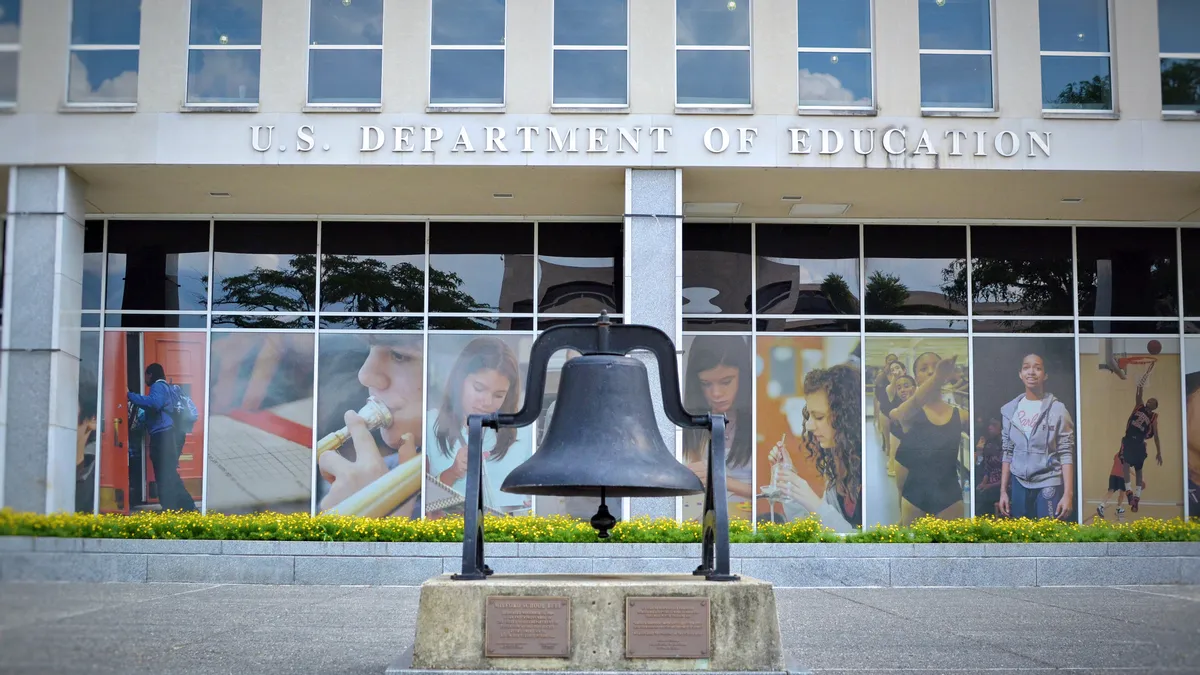Dive Brief:
- The three bodies that together oversee higher education in the U.S. are in need of an extreme overhaul, argues a new report from New America.
- The left-leaning think tank gave a list of recommendations for how to rework the regulatory "triad" ー accreditors, state agencies and the U.S. Department of Education. The report's authors wrote that these entities have long blamed the other when colleges fail.
- Their suggestions include reforming student aid and increasing federal oversight of accreditors. This comes after the Education Department finalized regulations last month that give accreditors more latitude, though critics of the rules — among them New America representatives — said they remove key accountability measures.
Dive Insight:
The Education Department's final regulations on accreditors remove their geographic boundaries and ease the process by which colleges can get programs approved.
The rules also loosen compliance standards for accreditors and make it easier for new accreditors to become recognized.
New America's report details the historic problems with accreditors, their unwillingness to be controlled by the federal government and the department's lack of interest in overseeing them. It spotlights an early attempt to address those concerns: In 2005, former Education Secretary Margaret Spellings formed a commission to study the issues with accreditors, which identified “significant” flaws. The commission's report found that accreditors' processes were not open or standardized to allow for comparisons across institutions.
Spellings started to form new rules that would fix some of these problems, but accreditors aggressively lobbied Congress and got lawmakers' help to halt any progress being made on new regulations, according to New America.
Clare McCann, deputy director for federal higher ed policy at New America, told Education Dive in an interview that students and parents misunderstand what accreditation means. When students think "accredited," they believe a college is "quality," she said.
"In reality, accreditors are not really looking at student outcomes and how they can be assured the college is quality for those students," she said.
The report picks out more recent and egregious examples of accreditation failures. Under one accreditor, the Accrediting Council for Independent Colleges and Schools (ACICS), three for-profit chains collapsed, affecting some 75,000 students. Obama's Education Department investigated ACICS and eventually pulled its recognition. However, the current department reversed the decision and ACICS is still active.
New America urged the department to restore "minimal oversight" over accreditors and hold them responsible for fulfilling their responsibilities.
It notes that when ACICS temporarily lost its status, 111 colleges under its purview were able to be approved by another agency with 18 months while 85 couldn't and 61 closed.
The think tank also points out that accrediting documents are not always made public and student-related outcomes are not always clear or consistent.
It also calls for some oversight of accreditors to be shifted to states, which it alleges have previously rubber-stamped approvals.
And it contends that the department has also failed to hold institutions accountable at the expense of students.
The department's Office of Federal Student Aid, in particular, has not kept up with the scale and scope of problems in higher ed in part because of its limited capacity. The office ensures that $120 billion in student aid is disbursed to colleges and their students each year, and it manages $1.5 trillion in student loans in repayment. The office has 1,300 employees overseeing more than 5,000 colleges — "a tall order" for a small federal agency, the report notes.
Angela Morabito, a department spokesperson, told Education Dive in an email that Education Secretary Betsy DeVos "completely agrees" that FSA has outgrown its structure and governance. She touted the administration's initiative on student aid, the Next Generation Financial Services Environment, of which the defining feature is a mobile app that helps students fill out their FAFSA.
"But Congress also needs to act," Morabito wrote. "With each passing year, Congress layers on more and more bureaucratic programs, repayment options, forgiveness plans, and complex rules for FSA to implement without the budget, people or governance structure it needs to be successful."













